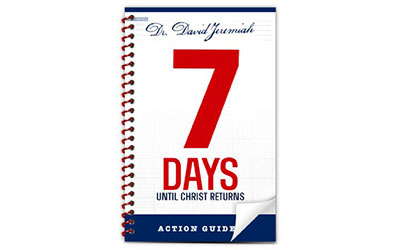7 Days Until Christ Returns
A well known Bible expositor wrote a book, whose title is borrowed for this article, to help believers prepare themselves against the day of Christ’s return. This article proposes a more certain, and Scripture-based, way to be ready for that day.
(Bấm vào đây để đọc tiếng Việt)
The action guide
 The author appeals to Jesus’ command to believers to be servants of others, and to the gifts God gives to each believer according to the parable of the talents, and other positive things they should do in preparing themselves for the day Christ comes again. This article will examine and rebut several faulty assumptions delivered in the sermon that was used as the basis for the action guide. The article is not written as an attack of the expositor or his ministries, but it sees the topic as emblematic of the common teachings that stunt believer’s growth, putting doubts in their relationship with God, and instead proposes a more Scriptural approach to achieve the readiness with certainty. Here’s the introduction to the “7 Days Until Christ Returns - An Action Guide.”
The author appeals to Jesus’ command to believers to be servants of others, and to the gifts God gives to each believer according to the parable of the talents, and other positive things they should do in preparing themselves for the day Christ comes again. This article will examine and rebut several faulty assumptions delivered in the sermon that was used as the basis for the action guide. The article is not written as an attack of the expositor or his ministries, but it sees the topic as emblematic of the common teachings that stunt believer’s growth, putting doubts in their relationship with God, and instead proposes a more Scriptural approach to achieve the readiness with certainty. Here’s the introduction to the “7 Days Until Christ Returns - An Action Guide.”
What would you do if you knew Jesus would return in seven days? Though the Bible clearly tells us that no man knows the date when Christ will return, it is an interesting and profound exercise to look at how our lives might change if we had the knowledge that Christ would return seven days from now. What would you do? Would your daily routine change? What is standing between you and the Lord that you would want to make right?
The dilemma
According to the expositor, though believers are doctrinally saved as they placed their trust in Christ, they must still face his judgement seat to give an answer to how they live while still in the flesh. Another well known expositor also gives this description of the judgement seat of Christ: “Thus, the purpose of the judgment seat of Christ is to examine a Christian’s total life. We will be recompensed for the deeds we have done, whether good or bad (2 Cor. 5:10). The term used there refers to a summing up and estimation of the total pattern of a believer’s life. “
The question that must be asked is: can the totality of a Christian’s relationship with God be compartmentalized into the parts before and after they’re saved, or specifically the unconditional forgiveness of their sins and the conditional rewards, or the lack thereof, that follow? Is there truth in the assertion that the completely grace-based gift of eternal life and the work-based recompense of the deeds while still in the flesh are all summed up to make up the total worth of a believer’s life?
A Christian journey through life usually follows a pattern where the grace-based gift of forgiveness of sins and eternal life recedes back to the brief moment in time when the believer expressed his trust in Christ, then yielded to the long stretch of the years ahead filled with question of one’s worth before the Lord: am I good enough for the Christ who is coming back? The assurance of salvation gradually fades away to the point the believer questions whether if it was even real, then subsequently he’s resigned to the possibility that he might not be saved after all. The question whether he’s done enough as he examines his deeds looms large in his mind, and perhaps like most believers he would instinctively pushes it to the back of his mind. The believer might return from the sermon full of zeal and a sense of purpose, maybe for the full 7 days, but those days will soon pass, and if he’s to continue the pattern of zeal any further he will most likely find himself worn out from the superhuman effort.
Now back to the topic from which this article was prompted to be written. The author of “7 Days Until Christ Returns” proposes two reasons why believers should do their utmost to prepare themselves to meet their Lord: 1) Christ’s call to servanthood, and 2) the talents he’s given to each and everyone. Let’s examine each one.
Servanthood
The author expounds on the servanthood attitude of believers, which is without doubt a virtue fitting for anyone who calls on the name of Christ. However, let us recall the context of this writing. The author puts us in the hypothetical 7 days before Christ returns which puts us in a more urgent state than normal. With only 7 days left, is servanthood likely among the most urgent thing to take care of? I’d venture not. Servanthood is more like a lifestyle, a pattern of living that characterizes a Christian’s life journey whether he has seven days left or not. It’s a fruit of a life born of the Spirit of God. But why stop at servanthood? There is forgiveness, compassion, humility, a giving heart, making amends, bible study, visiting the sick, and myriad other things high on the list of virtues Christians aspire to develop especially during these short 7 days.
Can a Christian realistically choose one most important thing he can do during the seven short days to make him more ready to meet his Lord? For the sake of argument, let’s just say we go easy and allow the Christian to pick only one most important thing on his list to accomplish on these seven days, and let’s say it’s servanthood.
What is the possibility that this Christian finds exactly a perfect opportunity to serve someone during this time? What is the likelyhood he will find something that has eluded him all the years before this hypothetical seven days? And lastly, will it make him more ready than he’d ever been? The answer to all these questions is a resounding NO. Christians have been doing this since the time of the book of Acts. They keep looking for something that makes them more on fire for God, something that magically transform their spiritual life. But there is no such thing, as everything ever proposed by someone has been proposed by someone else before, and nothing ever brought them closer to their goal. Servanthood, a nice idea, but as vague and as unmeasurable as any other lofty ideals.
The talents
There is a major problem with using the parable of the talents to prepare Christians to meet God because it is not about “recompense for the deeds done while in the flesh,” or about rewards or the lack thereof. It’s about salvation, who will be saved and who will not be. The evidence for this is in the last verse of this parable: “As for this worthless slave, throw him into the outer darkness, where there will be weeping and gnashing of teeth (Matthew 25:30).” God does not call his sanctified saint “worthless slave” and he will not cast them into outer darkness.
Additionally, our Lord God is nothing like the slave owner in this parable. He never reaps where he does not sow. And not only does he sow, he sows the amazing seed of the gospel: his only begotten Son.
Therefore, when this parable is applied indiscrimately to Christians, it cannot help but put them in the mindset of unsaved people, instead of allowing them to work out their salvation as children of God, it brings them back to the place where they’re still alienated from God and had to work to earn their salvation.
Faulty application
So far we’ve seen that the two basic premises of 7-Days put the believers in a wrong place in their attempt to prepare them for the day of Christ’s return. Though the expositor assures listeners that they’re already saved, in his encouraging them to better prepare themselves, he puts doubt in their minds that they may not be saved after all. The parable of the talents, in its being misapplied, is the principle offender.
Beyond the doctrinally erroneous applications of the servanthood exhortation and the parable of the talents, the practical implication is also great. How much is enough of my servitude, and to whom? How many talents have I been blessed with and how have I performed? No one knows with any certainty whether his achievements will be accepted by Christ upon his return. It’s all guesswork, and arbitrary. This is no way for the bridesmaids to wait for the arrival of their bridegroom.
Our faith in God, our hope of salvation, must be infinitely more certain than what is put forth in the “7 Days Until Christ Returns.”
Now faith is the substance of things hoped for, the evidence of things not seen. (Hebrews 11:1)
False premise
Can a Christian live the rest of his life as if each day is one of the last seven days before Christ returns?
The sermon, or the book, might be able to spur the believers to actions for maybe all the seven days, but the self imposed sense of urgency cannot realistically last for any long stretch of time or burnout will set in, and the brief experiment will prove itself to be another failed attempt in moving one on a higher spiritual plane.
The once for all perfection
For by a single offering he has perfected for all time those who are sanctified (Hebrews 10:14).
This is how we should prepare ourselves for the day of Christ’s return: to put our hope on what Christ had achieved for us instead of what we can produce with our flesh. If God has made us perfect in Christ, what is it that we’re lacking that causes him to withhold rewards from us? Are you relying on your own sacrifices and offerings or on the “single offering” prepared by God himself which alone can make you “perfect for all time?”
Fix your eyes upon Jesus (Hebrews 12:2), my friends. That’s how you prepare for 1 Day, for 7 Days, or even for the rest of your life as you await Christ’ return.
He who did not spare his own Son, but gave him up for us all–how will he not also, along with him, graciously give us all things? (Romans 8:32)
And if God graciously gives you all things along with his Son, will he be stingy about little things that you flesh can produce? Actually you should be glad that he’s not giving you rewards for what that comes from your flesh, because if he does, you may not like it. The rewards are actually threats that if you walk according to the letter of the law, its fruit will you reap.
You who are trying to be justified by the law have been alienated from Christ; you have fallen away from grace (Galatians_5:4)
Recompense
Before reaching the conclusion of this article, let us recall the quote of the well known author who refered to 2 Corinthians 5:10 to use in the same vein of thought as the author who erroneously quotes the parable of the talent to keep Christians on their toes as they wait for their Lord’s return. In the same manner as the misapplication of the parable of the talent, the Corinthians verse was also grossly misapplied to the detriment of anyone who subscribes to it.
If the context of 2 Corinthians 5:10 is used, we’d find that the recompense is not meant for Christians as rewards and punishments for actions they perform while in the flesh, but only as the outcome of one of the two choices one makes concerning Christ. The verse that follows helps explain why this is the case:
Therefore, because we know the fear of the Lord, we try to persuade people (2 Corinthians 5:11)
Paul was talking about a recompense before the judgement seat of Christ where the choice to believe in him leads to life while the choice of not believing leads to death. Therefore, in verse 11, Paul was conveying a message of reconciliation to his audience. He was not at all talking about rewards or the lack there of. The author of 7 Days, though tried to assure his audience that their salvation is secure, by presenting the parable of the talents or 2 Corinthians 5:10 in this manner, puts them in the same footing with unbelievers where the deprivation of reward is equally alarming as the danger of being alienated from God. This explains why those who subscribe to this belief system do not have any assurance of their salvation.
In conclusion
The Christians do not live a life of working toward rewards, but of waiting for the day they receive their inheritance. Rewards are unknown until they are given to their recipients, but an inheritance is known, though sealed as a promise, or a guarantee, and to be received in full just as we read in Romans 8:32.
What rewards can match the wonderful parts of our inheritance in Christ? Consider these: the indwelling Holy Spirit as a deposit guaranteeing our inheritance (Ephesians 1:11-14), the forgiveness of sins (Colossians 1:14), our sanctification and justification (1 Corinthians 6:11), Christ as our advocate (1 John 2:1), and every wonderful things included in Christ (Romans 8:32).
Last but not least, exhortations such as 7-Days makes a normal Christian life abnormal, it replaces contentment with dissatisfaction, it takes away thanksgiving for what God has given and replace it with yearning for what seems to be greater blessings enjoyed by others.
In the parable of the Ten Virgins, all ten virgins, both the wise and the foolish, fell asleep while waiting for the bridegroom who was a long time in coming. There was no indication of any difference in lifestyle, activities, or performance, between the wise and the foolish virgins, except one thing: the oil the virgins should take with them before they embark on their journey. That was the only thing that counts. That was how they should prepare to meet their Lord, for neither servanthood nor talents would get them the oil they needed.
Notes
The topic of Christian inheritance is discussed here: The Will of God
Nghi Nguyen
- Scripture quoted by permission. All scripture quotations, unless otherwise indicated, are taken from the NET Bible® copyright ©1996-2006 by Biblical Studies Press, L.L.C. All rights reserved.
Disclaimer: This is my own opinion on the topic, which does not necessarily reflect the church's theology, or beliefs of the individuals in it — Nghi Nguyen

